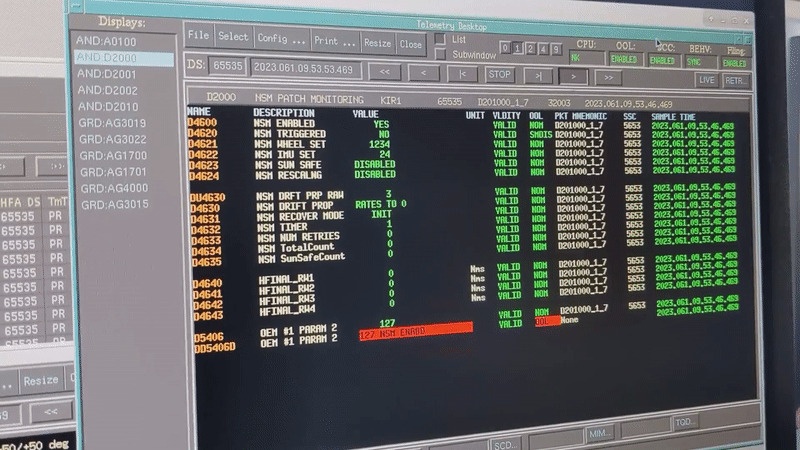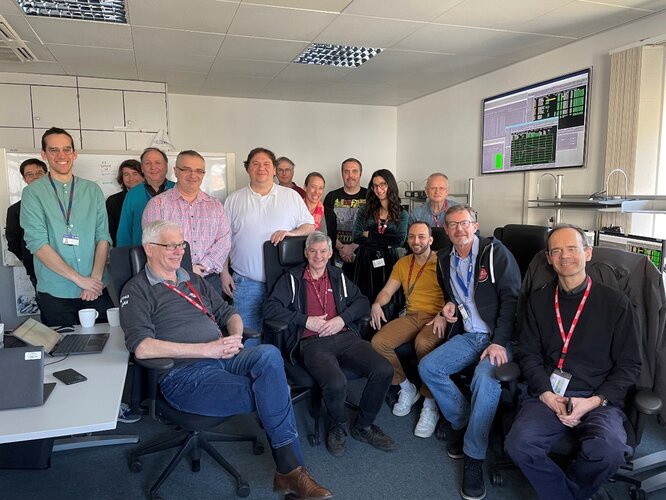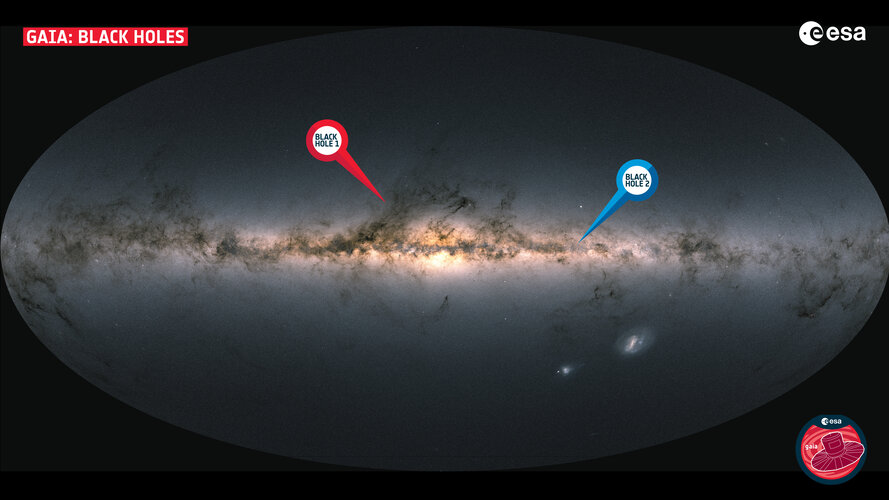Maxar eyes military customers for satellite images of objects in space
Thursday, 30 March 2023 19:54
Maxar, an Earth imaging company, is looking to build a new business imaging objects in space.
Telesat still bullish on Lightspeed despite funding uncertainty
Thursday, 30 March 2023 19:23
Telesat remains committed to developing its Lightspeed low Earth orbit broadband constellation despite ongoing delays to cover the project’s rising costs, CEO Dan Goldberg said March 29.
Integral's 'new safe mode' activates for the first time
Thursday, 30 March 2023 12:00 Image:
Integral's 'new safe mode' activates for the first time
Image:
Integral's 'new safe mode' activates for the first time Chinese defense contractor to begin launching VLEO satellites
Thursday, 30 March 2023 11:23
NASA releases draft strategy for long-term robotic Mars exploration
Thursday, 30 March 2023 10:36
NASA has unveiled a draft strategy for long-term robotic exploration of Mars that emphasizes low-cost missions and potential commercial partnerships.
Integral team at ESOC during safe mode commissioning
Thursday, 30 March 2023 06:59 Image:
Integral team at ESOC during safe mode commissioning
Image:
Integral team at ESOC during safe mode commissioning Scientists share 'comprehensive' map of volcanoes on Venus - all 85,000 of them
Thursday, 30 March 2023 06:29
St Louis MO (SPX) Mar 30, 2023
 Intrigued by reports of recent volcanic eruptions on Venus? WashU planetary scientists Paul Byrne and Rebecca Hahn want you to use their new map of 85,000 volcanoes on Venus to help locate the next active lava flow.
"This paper provides the most comprehensive map of all volcanic edifices on Venus ever compiled," said Byrne, an associate professor of earth and planetary sciences in Arts and
Intrigued by reports of recent volcanic eruptions on Venus? WashU planetary scientists Paul Byrne and Rebecca Hahn want you to use their new map of 85,000 volcanoes on Venus to help locate the next active lava flow.
"This paper provides the most comprehensive map of all volcanic edifices on Venus ever compiled," said Byrne, an associate professor of earth and planetary sciences in Arts and
 Intrigued by reports of recent volcanic eruptions on Venus? WashU planetary scientists Paul Byrne and Rebecca Hahn want you to use their new map of 85,000 volcanoes on Venus to help locate the next active lava flow.
"This paper provides the most comprehensive map of all volcanic edifices on Venus ever compiled," said Byrne, an associate professor of earth and planetary sciences in Arts and
Intrigued by reports of recent volcanic eruptions on Venus? WashU planetary scientists Paul Byrne and Rebecca Hahn want you to use their new map of 85,000 volcanoes on Venus to help locate the next active lava flow.
"This paper provides the most comprehensive map of all volcanic edifices on Venus ever compiled," said Byrne, an associate professor of earth and planetary sciences in Arts and Redness of Neptunian asteroids sheds light on early Solar System
Thursday, 30 March 2023 06:29
London, UK (SPX) Mar 29, 2023
 Asteroids sharing their orbits with the planet Neptune have been observed to exist in a broad spectrum of red colour, implying the existence of two populations of asteroids in the region, according to a new study by an international team of researchers. The research is published in the journal Monthly Notices of the Royal Astronomical Society: Letters.
The team of scientists from the USA,
Asteroids sharing their orbits with the planet Neptune have been observed to exist in a broad spectrum of red colour, implying the existence of two populations of asteroids in the region, according to a new study by an international team of researchers. The research is published in the journal Monthly Notices of the Royal Astronomical Society: Letters.
The team of scientists from the USA,
 Asteroids sharing their orbits with the planet Neptune have been observed to exist in a broad spectrum of red colour, implying the existence of two populations of asteroids in the region, according to a new study by an international team of researchers. The research is published in the journal Monthly Notices of the Royal Astronomical Society: Letters.
The team of scientists from the USA,
Asteroids sharing their orbits with the planet Neptune have been observed to exist in a broad spectrum of red colour, implying the existence of two populations of asteroids in the region, according to a new study by an international team of researchers. The research is published in the journal Monthly Notices of the Royal Astronomical Society: Letters.
The team of scientists from the USA, A Picture Perfect Day - Or To Be More Exact, a Day Perfect for Taking Pictures Sols 3783-3784
Thursday, 30 March 2023 06:29
Pasadena CA (JPL) Mar 27, 2023
 Due to some delayed downlink of images, we didn't receive all the information we needed in time to do contact science today. Although the data did eventually arrive, it was too late to allow us to get the arm out for contact science.
Each planning day has a very strict timeline, in order to make our scheduled uplink time, which is MSL's allotted time for using the Deep Space Network to get
Due to some delayed downlink of images, we didn't receive all the information we needed in time to do contact science today. Although the data did eventually arrive, it was too late to allow us to get the arm out for contact science.
Each planning day has a very strict timeline, in order to make our scheduled uplink time, which is MSL's allotted time for using the Deep Space Network to get
 Due to some delayed downlink of images, we didn't receive all the information we needed in time to do contact science today. Although the data did eventually arrive, it was too late to allow us to get the arm out for contact science.
Each planning day has a very strict timeline, in order to make our scheduled uplink time, which is MSL's allotted time for using the Deep Space Network to get
Due to some delayed downlink of images, we didn't receive all the information we needed in time to do contact science today. Although the data did eventually arrive, it was too late to allow us to get the arm out for contact science.
Each planning day has a very strict timeline, in order to make our scheduled uplink time, which is MSL's allotted time for using the Deep Space Network to get SpaceX sends 56 Starlink satellites into low-Earth orbit
Thursday, 30 March 2023 06:29
Washington DC (UPI) Mar 29, 2023
 SpaceX's 21st launch of the year sent 56 Starlink satellites into orbit from Cape Canaveral Space Force Station in Florida on Wednesday afternoon.
A Falcon 9 rocket lifted off at about 4 p.m., carrying 56 satellites into low-Earth orbit. The first stage booster successfully returned and landed on the "Just Read the Instructions" drone ship in the Atlantic Ocean about eight minutes after
SpaceX's 21st launch of the year sent 56 Starlink satellites into orbit from Cape Canaveral Space Force Station in Florida on Wednesday afternoon.
A Falcon 9 rocket lifted off at about 4 p.m., carrying 56 satellites into low-Earth orbit. The first stage booster successfully returned and landed on the "Just Read the Instructions" drone ship in the Atlantic Ocean about eight minutes after
 SpaceX's 21st launch of the year sent 56 Starlink satellites into orbit from Cape Canaveral Space Force Station in Florida on Wednesday afternoon.
A Falcon 9 rocket lifted off at about 4 p.m., carrying 56 satellites into low-Earth orbit. The first stage booster successfully returned and landed on the "Just Read the Instructions" drone ship in the Atlantic Ocean about eight minutes after
SpaceX's 21st launch of the year sent 56 Starlink satellites into orbit from Cape Canaveral Space Force Station in Florida on Wednesday afternoon.
A Falcon 9 rocket lifted off at about 4 p.m., carrying 56 satellites into low-Earth orbit. The first stage booster successfully returned and landed on the "Just Read the Instructions" drone ship in the Atlantic Ocean about eight minutes after Researchers create breakthrough spintronics manufacturing process that could revolutionize the electronics industry
Thursday, 30 March 2023 06:29
Minneapolis MN (SPX) Mar 21, 2023
 University of Minnesota Twin Cities researchers, along with a team at the National Institute of Standards and Technology (NIST), have developed a breakthrough process for making spintronic devices that has the potential to become the new industry standard for semiconductors chips that make up computers, smartphones, and many other electronics. The new process will allow for faster, more efficien
University of Minnesota Twin Cities researchers, along with a team at the National Institute of Standards and Technology (NIST), have developed a breakthrough process for making spintronic devices that has the potential to become the new industry standard for semiconductors chips that make up computers, smartphones, and many other electronics. The new process will allow for faster, more efficien
 University of Minnesota Twin Cities researchers, along with a team at the National Institute of Standards and Technology (NIST), have developed a breakthrough process for making spintronic devices that has the potential to become the new industry standard for semiconductors chips that make up computers, smartphones, and many other electronics. The new process will allow for faster, more efficien
University of Minnesota Twin Cities researchers, along with a team at the National Institute of Standards and Technology (NIST), have developed a breakthrough process for making spintronic devices that has the potential to become the new industry standard for semiconductors chips that make up computers, smartphones, and many other electronics. The new process will allow for faster, more efficien Astronomers witness the birth of a very distant cluster of galaxies from the early Universe
Thursday, 30 March 2023 06:29
Munich, Germany (SPX) Mar 30, 2023
 Using the Atacama Large Millimeter/submillimeter Array (ALMA), of which ESO is a partner, astronomers have discovered a large reservoir of hot gas in the still-forming galaxy cluster around the Spiderweb galaxy - the most distant detection of such hot gas yet. Galaxy clusters are some of the largest objects known in the Universe and this result, published in Nature, further reveals just how earl
Using the Atacama Large Millimeter/submillimeter Array (ALMA), of which ESO is a partner, astronomers have discovered a large reservoir of hot gas in the still-forming galaxy cluster around the Spiderweb galaxy - the most distant detection of such hot gas yet. Galaxy clusters are some of the largest objects known in the Universe and this result, published in Nature, further reveals just how earl
 Using the Atacama Large Millimeter/submillimeter Array (ALMA), of which ESO is a partner, astronomers have discovered a large reservoir of hot gas in the still-forming galaxy cluster around the Spiderweb galaxy - the most distant detection of such hot gas yet. Galaxy clusters are some of the largest objects known in the Universe and this result, published in Nature, further reveals just how earl
Using the Atacama Large Millimeter/submillimeter Array (ALMA), of which ESO is a partner, astronomers have discovered a large reservoir of hot gas in the still-forming galaxy cluster around the Spiderweb galaxy - the most distant detection of such hot gas yet. Galaxy clusters are some of the largest objects known in the Universe and this result, published in Nature, further reveals just how earl Light-bending gravity reveals one of the biggest black holes ever found
Thursday, 30 March 2023 06:29
Durham UK (SPX) Mar 29, 2023
 A team of astronomers has discovered one of the biggest black holes ever found, taking advantage of a phenomenon called gravitational lensing.
The team, led by Durham University, UK, used gravitational lensing - where a foreground galaxy bends the light from a more distant object and magnifies it - and supercomputer simulations on the DiRAC HPC facility, which enabled the team to closely e
A team of astronomers has discovered one of the biggest black holes ever found, taking advantage of a phenomenon called gravitational lensing.
The team, led by Durham University, UK, used gravitational lensing - where a foreground galaxy bends the light from a more distant object and magnifies it - and supercomputer simulations on the DiRAC HPC facility, which enabled the team to closely e
 A team of astronomers has discovered one of the biggest black holes ever found, taking advantage of a phenomenon called gravitational lensing.
The team, led by Durham University, UK, used gravitational lensing - where a foreground galaxy bends the light from a more distant object and magnifies it - and supercomputer simulations on the DiRAC HPC facility, which enabled the team to closely e
A team of astronomers has discovered one of the biggest black holes ever found, taking advantage of a phenomenon called gravitational lensing.
The team, led by Durham University, UK, used gravitational lensing - where a foreground galaxy bends the light from a more distant object and magnifies it - and supercomputer simulations on the DiRAC HPC facility, which enabled the team to closely e NASA rocket engines re-engineered as production restarts
Thursday, 30 March 2023 06:29
Bay St. Louis MS (SPX) Mar 29, 2023
 As NASA prepares for the first crewed Artemis missions to the Moon, agency propulsion and test teams are setting their sights on future Space Launch System (SLS) flights and working to improve one of the world's most powerful and reliable rocket engines for missions beginning with Artemis V.
A series of hot fire certification tests is in progress at NASA's Stennis Space Center near Bay St.
As NASA prepares for the first crewed Artemis missions to the Moon, agency propulsion and test teams are setting their sights on future Space Launch System (SLS) flights and working to improve one of the world's most powerful and reliable rocket engines for missions beginning with Artemis V.
A series of hot fire certification tests is in progress at NASA's Stennis Space Center near Bay St.
 As NASA prepares for the first crewed Artemis missions to the Moon, agency propulsion and test teams are setting their sights on future Space Launch System (SLS) flights and working to improve one of the world's most powerful and reliable rocket engines for missions beginning with Artemis V.
A series of hot fire certification tests is in progress at NASA's Stennis Space Center near Bay St.
As NASA prepares for the first crewed Artemis missions to the Moon, agency propulsion and test teams are setting their sights on future Space Launch System (SLS) flights and working to improve one of the world's most powerful and reliable rocket engines for missions beginning with Artemis V.
A series of hot fire certification tests is in progress at NASA's Stennis Space Center near Bay St. 

